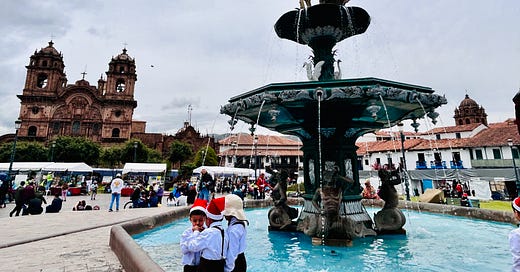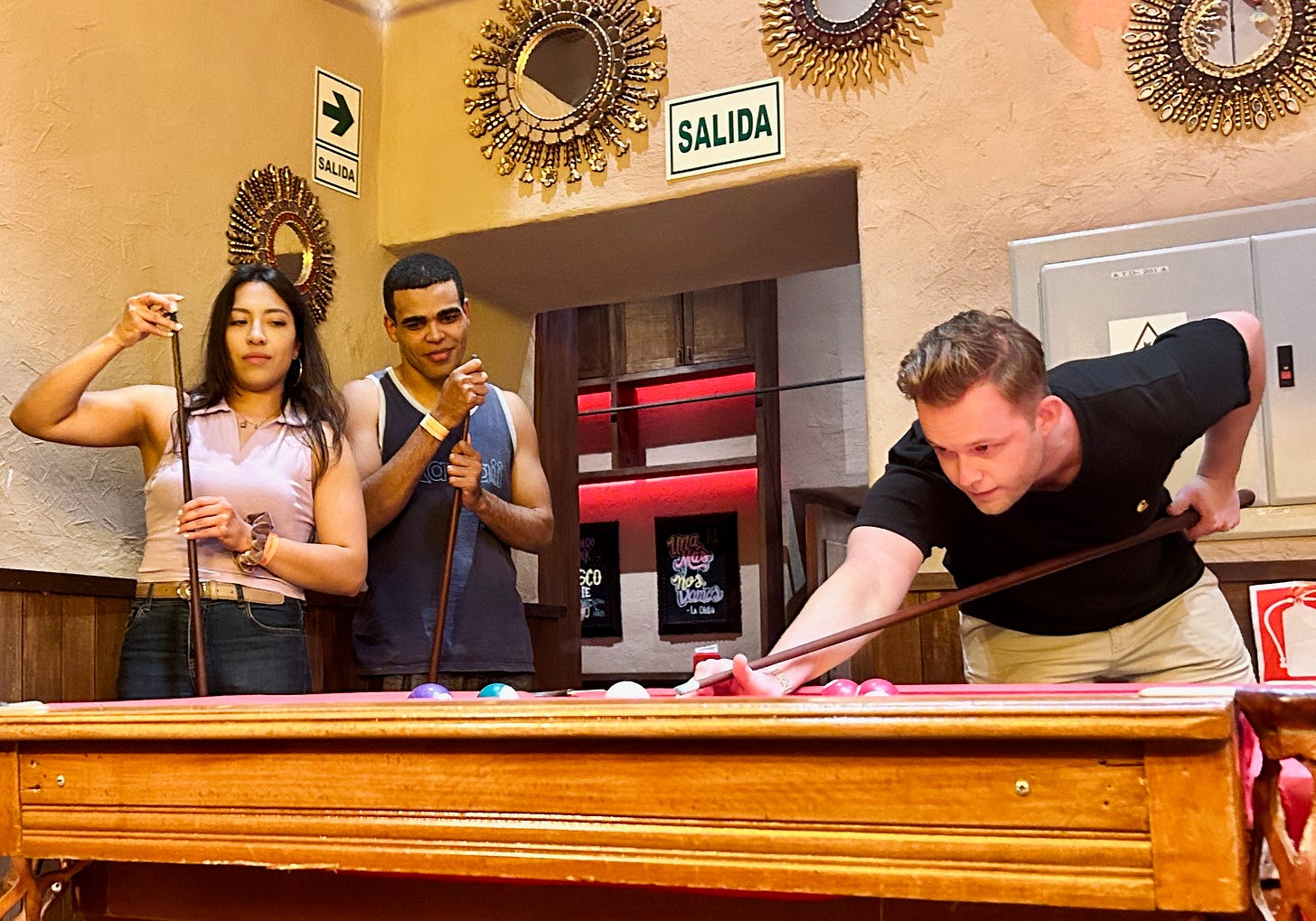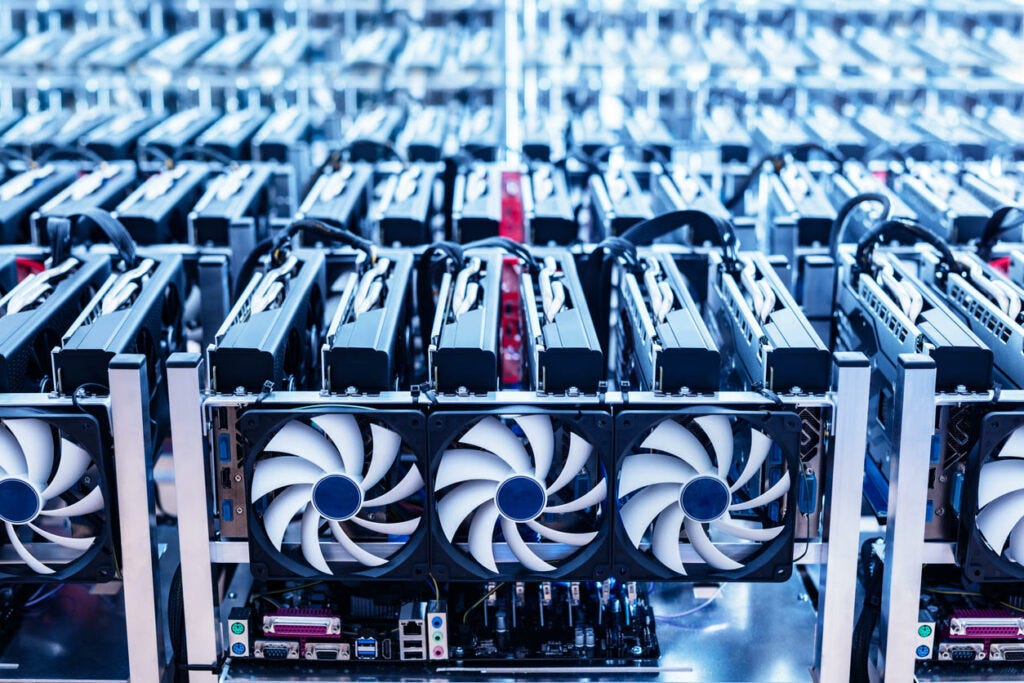I’m walking around Cusco, Peru, shooting pool, playing ping pong, and thinking about Bitcoin, ledgers, and digital super-intelligence.
Imagine someone running around with a piece of paper saying, “This is the paper you want to have your name on. Give me dollars and I’ll put your name on the list with a number next to it.”
Would you buy in? I did. For a little while.
Bitcoin is a text file. It’s a list of names and numbers. It’s a public distributed ledger, using a blockchain, without central oversight. The narrative is compelling. We can have a currency not controlled by elites, politicians, and bureaucrats. Bitcoin launched 14 years ago, and yet virtually everyone is still using currencies controlled by elites, politicians, and bureaucrats. The actual functionality of Bitcoin has been and currently is, black market transactions, a get-rich dream, and a gambling game.
When I was a Bitcoin bull, I thought Bitcoin was valuable because it’s supply limited. There’s only 21 million, they said. But it’s highly divisible, and breaking it down doesn’t change its usefulness. Consider a rare car with only 1,000 produced. There are only 1,000 because they're super hard to build and you can’t cut one up without destroying it. On the other hand, you can slice 1 bitcoin into 100 million pieces and it’s still the same thing as before: a number on a screen.
In the limit, only 1,000 individuals can own the rare car. How many people can own Bitcoin? Everyone. Each Bitcoin can be divided into 100 million pieces, meaning that in the limit, trillions of people can have their name on the ledger.
The rare car is supply-limited because it’s difficult to reproduce and indivisible. It’s indivisible because it has functionality. The supercar is beautiful, useful for transportation, fun, and a status signal. A rare car is a socially acceptable way to display financial wellness.
On the other hand, Bitcoin is low usefulness, not pretty, not fun to own, and it’s not an effective status signal because no one else can see the number on your screen. Walking around with your ledger number on your shirt would not be the same. A sign in your yard that says “I own 10 bitcoin” would have the opposite of the intended effect.
If there’s one cultural-religious group we should look to for financial wisdom, it’s the Jews. They have a saying, “Let your money be divided into three parts: a third in business, a third in land, and a third ready to hand."
The way I first heard the saying was, “Keep your wealth in forests, toll roads, and cash.” That is to say, a third is commodities, a third in reliable businesses, and a third in liquid cash.
Where does Bitcoin fit in? It’s not a useful commodity, it’s not a business with cash flows, and despite claiming to be a currency, transactions are slow and irreversible, the value is volatile, and it’s not accepted in mainstream marketplaces. As for the black market, Bitcoin is traceable, while other blockchain-based tokens are not.
If Bitcoin is “digital gold” then it’s worthless. Gold is valuable because it’s useful in our electronics, useful in our art, and useful for status signaling. Gold is malleable, distinct, and beautiful. People wear it. I could not wear my Bitcoin. Imagine someone walking around with a bracelet that says I own three bitcoins. I don’t think that’s going to catch on.
Distributed cryptographic ledgers (fancy text files) are useful and will be useful in the future, but I don’t see how the original Bitcoin ledger plays a role. If you can, let me know in the comments how Bitcoin plays a role in our economic future, beyond what it is now.
There is also the problem of Tether and companies like it. Tether a scam organization that says its Tether tokens are backed 1:1 with dollars in a bank account. But of course it’s not. A “stablecoin,” they call it. The same company that owns Tether owns a crypto exchange. They use unbacked Tether tokens to pump and dump crypto-coins, mainly Bitcoin.
The FTX collapse saga is the prime example of customers getting screwed in the crypto scam arena.
In 2021, I owned 1 bitcoin. In theory. I liked the idea of money detached from government. I liked the idea of getting rich by doing nothing. I liked the idea that I had the secret knowledge.
I put dollars into Bitcoin via a popular exchange. I don’t think the exchange added my name to the Bitcoin ledger with the number 1 next to it. If anything, I owned a share of the bitcoin that the exchange corporation owned.
One night, I came across a Twitter account tweeting about Tether. I caught a glimpse of the amount of fraud and delusion embedded in “crypto”. I started to look critically at the cult of Bitcoin believers changing their Twitter profile pictures to have laser eyes. I’m out.
1 Bitcoin was trading for $42,000.
I pressed Sell All to cash out for $42,000.
The exchange did a cute little animation.
When I tried to withdraw the dollars, suddenly there were “technical difficulties.” Eventually, I got the money. Not everyone was so fortunate.
The exchanges create easy-to-use interfaces for people to “buy Bitcoin.” Customers watch in a trance as the number on the screen goes up and down. They’re not “making money”. They are not actually buying anything. The exchange is not putting their names on the Bitcoin text file. The “customers” are just giving their money away in exchange for a bit of entertainment and the dream of getting rich and escaping a miserable work life.
The crypto exchanges sell a dream.
I am following the Jews’ advice — to some extent. My wealth is mostly in shares of businesses, about a third in cash, and I’m looking at buying more commodities. However, it’s hard to justify commodities when cash is earning 4.8%.
The notorious Bitcoin text file fails as a mainstream transacting tool, fails as a scarce commodity, and fails to generate cash flows.
The last thing Bitcoin can be is a product or service. The number on the screen goes up and down. And that’s why Bitcoin has value. Bitcoin is a game. Bitcoin is a dream.
In the long term, and when push comes to shove, people need food, water, shelter, tools, energy, medicine, work, relationships and sex. The current generation of Bitcoin believers and gamblers will get bored, need real stuff, and die off.
The Dollar
Bitcoin is used for gambling, black markets, and a Ponzi. The dollar is used for mainstream transactions and debt. The major downside of the dollar is that it’s controlled by a small group of humans. They can create more of them, at will, as a pernicious form of taxation.
The dollar (still) has value despite being controlled by morons because:
United States has the biggest military.
United States has the biggest economy.
The U.S. government is the largest employer and they pay salaries, contractors, and entitlements in dollars.
The U.S. government colludes with international oil producers to peg the dollar to oil by forcing oil buyers to purchase in dollars, hence the “petrodollar”.
The dollar is backed by the largest military, all major employers, and an international alliance of oil producers.
The US government pays its contractors in dollars. All large American employers pay their workers in dollars. Soon after getting their paycheck, workers spend most of their dollars on products and services. If there’s anything left over, they spend it on commodities and shares of businesses. There’s no room for Bitcoin in this equation. Even as a tool for gambling, black markets, and as a Ponzi scheme, Bitcoin has a lot of competition.
The end of an era. The next reserve currency.
The era of the dollar will come to an end. In 1971, politicians untied the dollar from gold. The day they did that, the dollar became doomed to be worthless. It’s a matter of how soon. The printing of dollars is a sneaky form of global taxation. This power is largely at the whim of seven governors, called The Fed, who are chosen by politicians. Things like this don’t last.
What will replace the dollar?
What piece of paper will be THE ledger that the world defers to?
A better question is, who gets to decide?
Usually, the biggest kid on the block gets to decide. The entity with the greatest capability for violence. Or, the payer of universal high income. Military power and economic power are inseparable, so the biggest kid on the block and the greatest economic power is likely to be the same entity.
America has been the biggest kid on the block for a long time. America was already the largest economy when we invented nuclear bombs and gained a clear monopoly on violence. Unsurprisingly, the dollar was chosen as the world’s reserve currency. Instead of gold reserves, countries accumulate dollars.
However, things are changing.
The consensus is that China’s economic power will grow to be double that of America. Would that lead be large enough to supplant the dollar? In a fight between a 100-pound man and a 200-pound man, the 200-pound man typically gets his way. But the outcome is not predetermined. Example: Russia vs Ukraine did not go the way Russia thought it would.
The Wildcard: Artificial Intelligence
The US Federal government is the corporation that developed nuclear bombs first. But what if a public or private for-profit corporation made nukes first? Would they then be the biggest kid on the block, bigger than nation-states?
Artificial digital superintelligence is a little different than nukes, hopefully, because its power could be predicated on production, not destruction.
The US Federal gov is not excelling in AI development, but corporations are. The teams that are excelling are relatively small. It appears that multiple corporations, around the world, could create varying levels of digital superintelligence around the same time.
If I had to guess, Team America will lead AI development.
Economy = (humans x output per human) + (bots x output per bot)
The number of robots and output per robot will continue to take off exponentially in America.
This will give more economic and military power to America, buying more time for the dollar to be the reserve currency.
Any prediction of what comes after digital superintelligence is a low-probability prediction. In the limit, I predict that a digital superintelligence chooses the next global ledger.
A big question in this macroeconomic discussion is: can digital superintelligence solve the low birth rate problem, in both the West and China?
So far, the advancement of technology has led to more pregnancy prevention, more financial wealth, more education, less religion, and fewer babies. (The neoliberal urban monoculture believes that all these things are good.) But past performance does not guarantee future performance. A super persuasive digital intelligence could raise birth rates. It could help stabilize the birth rate around the replacement rate to maintain the population.
How long it takes to get there is unclear. How many people will be lost before that happens?
In the limit, the number of human workers and output per worker could be moot compared to the number of robots and output per robot.
Perhaps China chooses the next reserve currency, or perhaps it is digital superintelligence is paying out universal high income.
Bitcoin is not in the conversation about who decides the next reserve currency. Some people think Bitcoin has a major role in the future of economics. I have heard things like “Believe in Bitcoin.” It seems highly improbable that the next superpower will choose Bitcoin as the global ledger. Why would it? I suppose that at times the word “Bitcoin” is used in lieu of the word “blockchain” because “Bitcoin” gets more clicks. But blockchain technology in general is more useful than the Bitcoin ledger. Perhaps the next global reserve currency is a descendant of the blockchain technology that Bitcoin made known.
Join
I write stories that maximize insight through entertainment. My stories are free to read. Paid subscribers bring my writing to the next level. As for any artist, supporting financially helps create works of art. With your support, I will become one of the greatest writers in the world.
The two main ways that people discover my stories are through word of mouth and readers sharing online. Share with your friends because sharing is an act of generosity.
Links
I’ve chatted with people from all around the world via curiosity conversations. Schedule one here.
I also post videos and podcasts on YouTube.
My email is writechrisjames@ gmail . com











